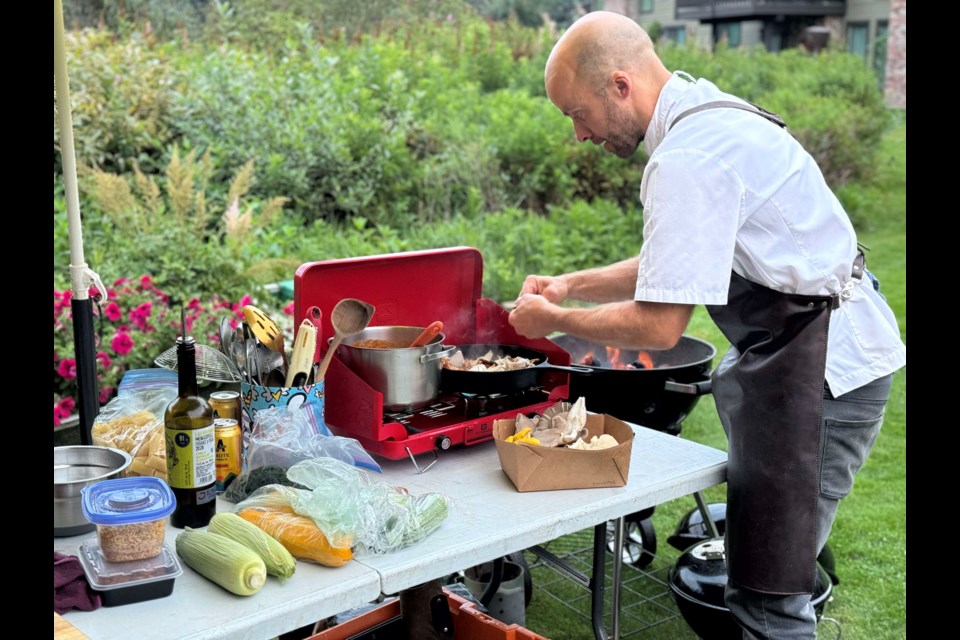Whistler and Pemberton are known for having fresh, locally produced food and an award-winning restaurant scene.
But food lovers in the village have a new asset that merges local food supply with elevated home cooking, thanks to lifelong chef Hugh Flint and foodie Richard Kinar. The duo is teaming up to start the Whistler Cooking Club. The pair makes a smart team, merging Flint’s knowledge as a chef and his experience teaching nutrition-based cooking classes at the Whistler Community Services Society (WCSS) with Kinar’s dream of improving people’s confidence in the kitchen with food science.
Growing up, Flint spent his days in the garden or going to a market with his mom for fresh produce. He wants to reconnect people with this “intrinsic” part of their life.
“Food was always central to everything we did as a family, and what I’ve noticed is that it’s very separate for a lot of people in the modern world. It’s a hassle and something they have to do, rather than something that’s integrated into their life,” Flint said.
“So, my goal is to really help people make cooking part of their life, something intrinsic that really fuels the rest of their life in a positive way.”
Cooking science
The team will take insights from two books Kinar’s been poring over for months: The Food Lab, by J. Kenji López-Alt and Salt Fat Acid Heat by Samin Nosrat. Both are available for loan at the Whistler Public Library or for purchase at Armchair Books.
In 900 pages, The Food Lab takes readers into the science behind American delights like steak or mac and cheese, examining “heat, energy, and molecules that create great food,” according to the
author’s website.
Salt Fat Acid Heat comes from a New York Times Magazine food columnist and the book also has a series available on Netflix.
“I’ve been using the principles in my own cast iron frying pan here in the condo, and the outcome has been amazing,” Kinar explained.
“So, I really wanted to share that with other people.”
He wasn’t always focused on cooking science, though. Kinar found himself unmotivated from repetitive meal prep—cook a piece of chicken, cook a piece of fish, shop for the same groceries, rinse and repeat.
“I always relied on a recipe or what my mom had cooked at home,” he said.
Learning food science has improved his confidence, and Flint and Kinar aim to do the same for other would-be home cooks.
Instead of always following along with a recipe, club members can become a guide—knowing what went wrong or what went right, how to effectively season, and to gain confidence buying fresh produce and building a dinner plan around it.
At-home lab
The plan for the club is straightforward. The group learns about a subject like grilling and a few recipes under that subject. They get a recipe sheet referencing techniques from the textbooks, and then they gather to cook together. Flint comes with the ingredients, offering guidance and personal experience with the concepts. When all is said and done, club members sit down together and enjoy a meal.
To show and not just tell Pique the science and delight behind cooking local food, Kinar dropped off locally grown shishito peppers for this reporter to try her hand at cooking. I’d never heard of the pepper, which he said are commonly found at farmers’ markets.
The shishitos came from Pemberton and have a wrinkled green skin and a long, skinny stem. At first glance, one could confuse them with a habanero, though they are rarely spicy. Instructions were simple: rub on olive oil, season with salt and pepper in a bowl, put onto a hot cast iron pan and lightly blister the skin.
The peppers popped in the pan and steam rose from the stove as I tossed them a few times. Once plated, I applied a bit more salt and fresh lemon juice. It was an incredibly simple appetizer with an elevated flavour. The salt and lemon balanced each other out and they were a delightful new addition to my somewhat meagre and repetitive cooking repertoire.
I likely would never have picked them up while out shopping, which gives credence to Kinar’s belief that people ignore what they don’t know.
“People tend to gloss over things that they’re not familiar with,” he said.
So, if readers are looking to expand their skill set with like-minded individuals, send an email to Kinar at [email protected].
The two are working on a Facebook group and hope to start lessons ahead of Thanksgiving and Christmas, times when cooking for friends and family can come with anxiety, and getting a reservation in Whistler is about as competitive as buying flour in 2020.




